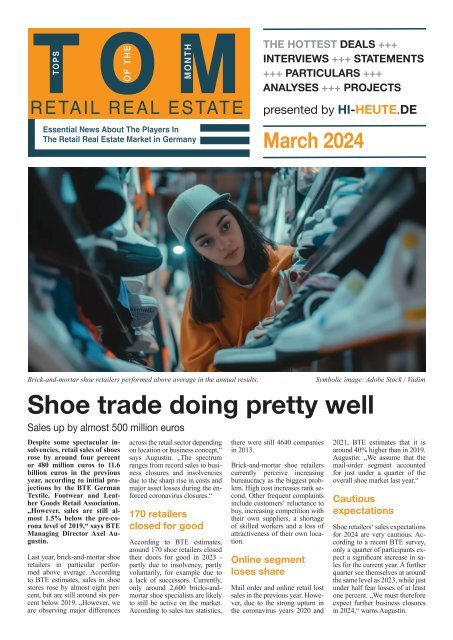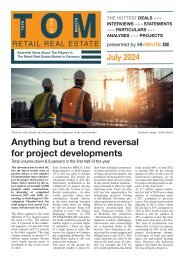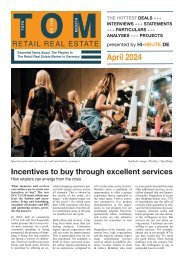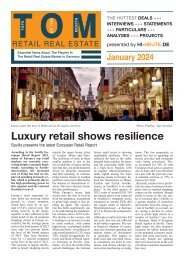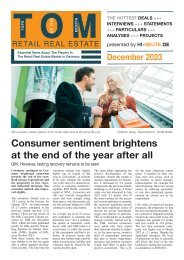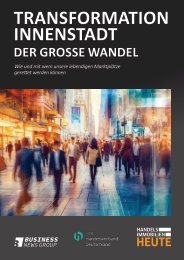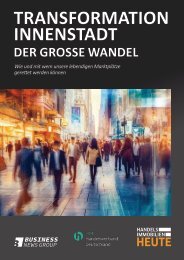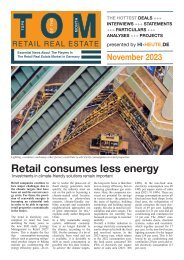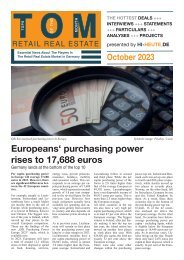Create successful ePaper yourself
Turn your PDF publications into a flip-book with our unique Google optimized e-Paper software.
T<br />
TOPS<br />
M<br />
OF THE MONTH<br />
<strong>TOM</strong>O<br />
RETAIL REAL ESTATE<br />
TOPS<br />
OF THE<br />
MONTH<br />
Essential News About The Players In In<br />
The Retail Real Property Estate Market In in Germany<br />
THE HOTTEST DEALS +++<br />
INTERVIEWS +++ STATEMENTS<br />
+++ PARTICULARS +++<br />
ANALYSES +++ PROJECTS<br />
presented by HI-HEUTE.DE<br />
March <strong>2024</strong><br />
Brick-and-mortar shoe retailers performed above average in the annual results. <br />
Shoe trade doing pretty well<br />
Sales up by almost 500 million euros<br />
Despite some spectacular insolvencies,<br />
retail sales of shoes<br />
rose by around four percent<br />
or 480 million euros to 11.6<br />
billion euros in the previous<br />
year, according to initial projections<br />
by the BTE German<br />
Textile, Footwear and Leather<br />
Goods Retail Association.<br />
„However, sales are still almost<br />
1.5% below the pre-corona<br />
level of 2019,“ says BTE<br />
Managing Director Axel Augustin.<br />
Last year, brick-and-mortar shoe<br />
retailers in particular performed<br />
above average. According<br />
to BTE estimates, sales in shoe<br />
stores rose by almost eight percent,<br />
but are still around six percent<br />
below 2019. „However, we<br />
are observing major differences<br />
across the retail sector depending<br />
on location or business concept,“<br />
says Augustin. „The spectrum<br />
ranges from record sales to business<br />
closures and insolvencies<br />
due to the sharp rise in costs and<br />
major asset losses during the enforced<br />
coronavirus closures.“<br />
170 retailers<br />
closed for good<br />
According to BTE estimates,<br />
around 170 shoe retailers closed<br />
their doors for good in 2023 -<br />
partly due to insolvency, partly<br />
voluntarily, for example due to<br />
a lack of successors. Currently,<br />
only around 2,600 bricks-andmortar<br />
shoe specialists are likely<br />
to still be active on the market.<br />
According to sales tax statistics,<br />
there were still 4640 companies<br />
in 2013.<br />
Brick-and-mortar shoe retailers<br />
currently perceive increasing<br />
bureaucracy as the biggest problem.<br />
High cost increases rank second.<br />
Other frequent complaints<br />
include customers‘ reluctance to<br />
buy, increasing competition with<br />
their own suppliers, a shortage<br />
of skilled workers and a loss of<br />
attractiveness of their own location.<br />
Online segment<br />
loses share<br />
Mail order and online retail lost<br />
sales in the previous year. However,<br />
due to the strong upturn in<br />
the coronavirus years 2020 and<br />
Symbolic image: Adobe Stock / Vadim<br />
2021, BTE estimates that it is<br />
around 40% higher than in 2019.<br />
Augustin: „We assume that the<br />
mail-order segment accounted<br />
for just under a quarter of the<br />
overall shoe market last year.“<br />
Cautious<br />
expectations<br />
Shoe retailers‘ sales expectations<br />
for <strong>2024</strong> are very cautious. According<br />
to a recent BTE survey,<br />
only a quarter of participants expect<br />
a significant increase in sales<br />
for the current year. A further<br />
quarter see themselves at around<br />
the same level as 2023, while just<br />
under half fear losses of at least<br />
one percent. „We must therefore<br />
expect further business closures<br />
in <strong>2024</strong>,“ warns Augustin.
Page 2<br />
In the 60th anniversary year<br />
of the future Westfield Ruhr<br />
Park in Bochum, Unibail-Rodamco-Westfield<br />
(URW) is<br />
crowning the success story of<br />
one of the largest shopping and<br />
leisure destinations in Germany:<br />
Westfield Ruhr Park will<br />
be only the third destination<br />
in Germany to bear the internationally<br />
renowned Westfield<br />
brand name, alongside Westfield<br />
Centro in Oberhausen<br />
and Westfield Hamburg-Überseequartier.<br />
With the new name goes a quality<br />
concept from the lifestyle,<br />
shopping, gastronomy and leisure<br />
sectors. The renaming to<br />
Westfield Ruhr Park will take<br />
place on September 26, <strong>2024</strong><br />
as part of a major event to mark<br />
the 60th anniversary of the center,<br />
which opened in 1964.<br />
Westfield Ruhr Park will now<br />
be one of the 40 Westfield flagship<br />
destinations in the USA and<br />
Europe. The combination of the<br />
international reputation of the<br />
Westfield brand and the local<br />
tradition of the center in Bochum<br />
should further increase<br />
the attractiveness of the location<br />
and at the same time give<br />
NEWS<br />
New brand identity as<br />
Westfield Ruhr Park<br />
URW Germany plans to rebrand the Bochum destination<br />
The Bochum shopping destination will soon be known as Westfield<br />
Ruhr Park. <br />
Visualization: URW<br />
the entire city of Bochum and<br />
the surrounding region even<br />
more appeal.<br />
Andreas Hohlmann, Managing<br />
Director Austria & Germany<br />
at Unibail-Rodamco-Westfield,<br />
says: „In the year of the 60th<br />
anniversary of the future Westfield<br />
Ruhr Park, we are sending<br />
a clear signal and underlining<br />
the future viability of the location.<br />
Under the new brand<br />
name Westfield Ruhr Park, the<br />
already very successful destination<br />
will become even more<br />
attractive for international and<br />
national brands and concepts in<br />
future. In conjunction with the<br />
rebranding, we will also work<br />
consistently on the strategic<br />
development of Westfield Ruhr<br />
Park and position it even more<br />
succinctly as a flagship destination<br />
with an extraordinary mix<br />
of retail and experience-oriented<br />
gastronomy and entertainment<br />
concepts.“<br />
March <strong>2024</strong><br />
Deutsche EuroShop<br />
reports significant<br />
growth for 2023<br />
Shopping center investor Deutsche<br />
EuroShop has now announced<br />
its preliminary and as yet<br />
unaudited results for the 2023<br />
financial year. „We recorded<br />
significant growth in 2023, both<br />
operationally and in terms of<br />
our investment portfolio. Customer<br />
footfall and tenant sales<br />
continued their recovery. Compared<br />
to 2022, 5.7% more people<br />
visited our shopping centers<br />
and our tenants increased their<br />
retail sales by 8.6%,“ explains<br />
CEO Hans-Peter Kneip.<br />
German fashion<br />
industry with<br />
double-digit sales<br />
growth in 2023<br />
German clothing manufacturers<br />
achieved double-digit sales<br />
growth of 10.8% and a turnover<br />
of 6.8 billion euros in 2023. In<br />
addition, the official figures<br />
from the Federal Statistical Office<br />
show a year-on-year increase<br />
in the number of employees<br />
of 3.8% to just under 20,000,<br />
which the industry organization<br />
GermanFashion Modeverband<br />
Deutschland describes as „pleasing“.<br />
In comparison, the number of<br />
business premises remained stable<br />
with a slight increase of 1.2<br />
percent, whereby the statistics<br />
refer to businesses with more<br />
than 50 employees.<br />
New offers and ideas for Boulevard Berlin<br />
H&M comes to the shopping center with a home range<br />
Boulevard Berlin will open in<br />
<strong>2024</strong> with new offerings, including<br />
the arrival of H&M and<br />
H&M Home. In addition to jewelry<br />
and clothing, the fashion<br />
brand will also offer decorative<br />
items and home accessories<br />
in an additional space in the<br />
future.<br />
In addition, the electronics store<br />
Saturn has confirmed that it will<br />
remain in Boulevard Berlin. The<br />
Boulevard is also launching a<br />
new marketing campaign for the<br />
new year, in which the stylized<br />
B in the logo plays an important<br />
role.<br />
The redesign measures at Boulevard<br />
Berlin will continue in<br />
Boulevard Berlin is changing its face. <br />
<strong>2024</strong>. This will bring many positive<br />
developments for the shopping<br />
offer, which will be concentrated<br />
on the two lower floors<br />
in future. The sporting goods<br />
manufacturer Nike and Paper<br />
Photo: Boulevard Berlin<br />
& Tea were already two new<br />
additions to the store in 2023.<br />
In <strong>2024</strong>, H&M will not only<br />
modernize its existing range in<br />
Boulevard Berlin, but will also<br />
significantly expand it. With the<br />
opening of a new H&M Home<br />
on 3000 square meters, the company<br />
wants to ensure that customers<br />
can store for decorative<br />
and furnishing items. The store<br />
will remain open throughout the<br />
renovation.<br />
Saturn already modernized its<br />
5000 square meter space last<br />
year and will remain a tenant of<br />
Boulevard Berlin. The same applies<br />
to the perfumery Douglas<br />
and the shoe retailer Deichmann.<br />
The latter is relocating from the<br />
second floor to the first floor in a<br />
much larger space. In addition, a<br />
number of other innovations are<br />
already in the starting blocks for<br />
<strong>2024</strong>.
Page 3<br />
TOP STATEMENT OF THE MONTH March <strong>2024</strong><br />
TOP STATEMENT<br />
March<br />
„From the outset,<br />
my role was that of<br />
a restructurer and<br />
liquidator, with the<br />
clear aim of transferring<br />
as many<br />
Real stores and<br />
their employees<br />
as possible to the<br />
new operators<br />
and closing as few<br />
stores as possible<br />
in the end. On<br />
the one hand, the<br />
stores were to be<br />
handed over to<br />
Kaufland, Edeka,<br />
Rewe etc., while<br />
on the other hand<br />
the active stores<br />
had to continue<br />
to generate good<br />
sales and positive<br />
contribution margins.<br />
This project<br />
is unique in the<br />
history of European<br />
retail.“<br />
Bojan Lucer, last CEO of<br />
Real, in an article in the<br />
Immobilien Zeitung
Firmly aware<br />
of our impact<br />
We are a visible force for sustainable economic progress and urban innovation.<br />
Sustainability driven, we nurture the communities where we build and foster<br />
things that last for their wellbeing.<br />
www.sonaesierra.com
Page 5 ANALYSES March <strong>2024</strong><br />
Insolvency trend in the<br />
food service industry continues<br />
Current analysis: the wave has only just begun<br />
Between 2020 and 2023,<br />
around 48,000 businesses in<br />
the catering industry closed<br />
across Germany. During this<br />
period, 6,100 businesses went<br />
out of business due to insolvency.<br />
In 2023 alone, around<br />
one in ten catering businesses<br />
closed. This is according to an<br />
analysis by Creditreform.<br />
„The food service industry is<br />
one of the main losers of the<br />
crisis in recent years. The sector<br />
is almost helplessly at the<br />
mercy of rising costs due to<br />
inflation. There are hardly any<br />
alternatives. At the same time,<br />
the necessary price increases are<br />
driving customers away,“ says<br />
Patrik-Ludwig Hantzsch, Head<br />
of Creditreform Economic Research.<br />
„The hospitality industry<br />
had not yet recovered from<br />
the coronavirus crisis when the<br />
next blow came in the form of<br />
inflation.“ Price-adjusted sales<br />
and earnings in the hospitality<br />
industry are currently still below<br />
the 2019 level.<br />
Many young<br />
businesses affected<br />
OPS F THE ONTH<br />
In the previous year, one in ten catering businesses went out of business.<br />
<br />
Symbolic image: Pixabay / Cindy Parks<br />
THE HOT<br />
INTERVIE<br />
+++ PAR<br />
ANALYSE<br />
presente<br />
Marc<br />
Between 2022 and 2023, insolvencies<br />
in the catering industry<br />
rose by 27%, which is higher<br />
than the average for the economy<br />
as a whole. A deeper breakdown<br />
reveals an even more differentiated<br />
picture of insolvency<br />
trends: the rise in insolvency<br />
figures was above average in<br />
the „caterers, food service providers“<br />
sub-sector (up 67%). Insolvency<br />
figures in this segment<br />
are now higher than in 2019.<br />
„Restaurants, catering, snack<br />
bars“ (up 32%) also recorded a<br />
massive increase recently. However,<br />
the volume still remained<br />
below the pre-corona level.<br />
Insolvencies in the „Discotheques,<br />
bars, other beverage outlets“<br />
sector rose less sharply<br />
(up 13%). Insolvencies in the<br />
catering sector are primarily<br />
concentrated in young companies<br />
that were no more than five<br />
years old (49% of all cases).<br />
There was also a marked increase<br />
in the number of cases among<br />
these young catering businesses<br />
in 2023 (up 30%). In addition,<br />
micro-businesses with no or no<br />
more than ten employees are often<br />
affected (88% of cases).<br />
Silent retirements<br />
on the rise<br />
„Our evaluations suggest that<br />
the insolvency trend in the hospitality<br />
industry will continue.<br />
The wave has only just begun,“<br />
emphasizes Hantzsch. He expects<br />
insolvencies in the sector<br />
to continue to rise. In this<br />
respect, the pre-corona level is<br />
likely to be reached again soon -<br />
the number of insolvencies may<br />
already exceed this in <strong>2024</strong>. The<br />
number of „other business closures“<br />
is also likely to remain<br />
at a high level. Due to the small<br />
size and creditor structure - the<br />
suppliers - in most cases there<br />
will be „silent exits“ without extensive<br />
insolvency proceedings.<br />
„The overall economic conditions<br />
are currently anything but<br />
favorable for the hospitality<br />
industry. The increase in VAT<br />
for food at the beginning of the<br />
year has certainly not helped to<br />
ease the situation. The catering<br />
industry in Germany is being<br />
further thinned out,“ continues<br />
Hantzsch. Government aid<br />
has also played a major role in<br />
survival during the lockdown,<br />
preventing closures for the time<br />
being.<br />
Regional<br />
differences<br />
The susceptibility to insolvency<br />
also varies from region to region.<br />
The increase in insolvencies<br />
in the catering sector was above<br />
average in Schleswig-Holstein<br />
(up 65%), followed by Saxony<br />
(up 53%) and Baden-Württemberg<br />
(up 45%). There has been<br />
little or no increase in insolvencies<br />
in the hospitality industry<br />
in Saxony-Anhalt and Lower<br />
Saxony.<br />
T<br />
TOPS<br />
O M<br />
OF THE MONTH<br />
<strong>TOM</strong><br />
TOPS<br />
OF THE<br />
MONTH<br />
RETAIL REAL ESTATE<br />
Essential News About The Players In In<br />
The Retail Real Property Estate Market In in Germany<br />
IMPRINT<br />
Publisher:<br />
Handelsimmobilien Heute Verlagsgesellschaft<br />
mbH<br />
Address:<br />
Alexanderstraße 16<br />
45130 Essen<br />
Germany<br />
Tel. 0049-201-45 84 23 99<br />
Web: www.hi-heute.de<br />
Mail: tom@hi-heute.de<br />
Frequency of publication:<br />
monthly<br />
Circulation: approx. 5000 copies<br />
sent by e-mail<br />
Editorial team: Susanne Müller,<br />
Thorsten Müller<br />
Responsible in terms of press<br />
law: Thorsten Müller<br />
Layout: K4-PR, Essen
URBAN CREATORS.<br />
Architecture | Development & Project Management<br />
European Council of Shopping Places (ECSP) Awards: Commendation for Best Renovation/Expansion for centres between 15.000 – 45.000 sqm
Page 7 INTERVIEW March <strong>2024</strong><br />
„We are strengthening existing<br />
properties and adding new qualities!“<br />
<strong>TOM</strong> exclusive interview with Andrew handing Jones and Stefan Pehle from Aukett + Heese<br />
The architects at AUKETT<br />
+ HEESE (headquartered in<br />
Berlin) have been planning<br />
complex projects since 1992.<br />
It all started 30 years ago with<br />
one person and is now carried<br />
on by 140 employees with great<br />
commitment and sound experience.<br />
<strong>TOM</strong> editor-in-chief<br />
Thorsten Müller wanted to<br />
know how they see the changes<br />
in planning and construction<br />
technology for large retail properties<br />
and spoke to director<br />
Andrew Henning Jones and<br />
management member Stefan<br />
Pehle.<br />
<strong>TOM</strong>: The German Retail<br />
Association is forecasting the<br />
closure of around 5,000 stores<br />
nationwide by the end of <strong>2024</strong>:<br />
what challenges will retail properties<br />
face as a result from an<br />
urban planning perspective?<br />
Stefan Pehle: Retail properties<br />
are currently facing challenges<br />
and profound structural upheavals<br />
resulting from the transformation<br />
of the retail sector and<br />
changes in customer behavior.<br />
Architects today must therefore<br />
- in addition to mastering urban<br />
planning and functional tasks,<br />
statics, technical installations,<br />
etc. - find innovative solutions<br />
to meet these challenges. - They<br />
have to find innovative solutions<br />
to master this change in meaning<br />
and at the same time develop an<br />
energy-efficient and sustainable<br />
solution.<br />
Andrew Henning Jones: Our<br />
aim at AUKETT + HEESE is to<br />
design future-proof architecture<br />
that is sustainable, fits well into<br />
the context and creates a strong<br />
identity. With regard to city centers,<br />
for example, vacant offices<br />
or retail spaces are a major and<br />
interesting challenge when it comes<br />
to creating an attractive and<br />
identity-forming environment<br />
for retailers.<br />
<strong>TOM</strong>: Which subsequent or<br />
interim use concepts, especially<br />
for large department stores,<br />
do you see opportunities for?<br />
And: Are there limits?<br />
Stefan Pehle: The repurposing<br />
of vacant space contributes sig<br />
Andrew Henning Jones and Stefan Pehle from Aukett + Heese.<br />
<br />
Photo: Aukett + Heese<br />
nificantly to the repositioning<br />
of entire building complexes.<br />
We see good opportunities for<br />
mixed uses with remaining retail<br />
uses or services on the ground<br />
and first floors and - where possible<br />
- residential and office uses<br />
on the upper floors. However,<br />
the decline of department stores<br />
and the associated risk of innercity<br />
desolation also offers opportunities<br />
for the establishment<br />
of social and cultural facilities<br />
and educational institutions.<br />
With regard to the conversion of<br />
buildings in general, most existing<br />
retail spaces can be adapted<br />
to changing requirements.<br />
Important factors here are room<br />
dimensions, materials and the<br />
existing load-bearing construction<br />
and structure. These must<br />
be sufficiently flexible. If these<br />
fit, other uses can be realized<br />
in the properties than originally<br />
planned. The limits of what<br />
is feasible are then more likely<br />
to be set economically - with a<br />
view to returns.<br />
<strong>TOM</strong>: Do you have any examples?<br />
Andrew Henning Jones: One<br />
example is the conversion of<br />
Forum Steglitz from the 1970s.<br />
On behalf of REAL I.S. AG, we<br />
carried out the architectural conversion<br />
and repositioning of the<br />
entire building, which was completed<br />
by 2022.<br />
In the process, 1,000 sqm of<br />
new space was created and<br />
around 10,000 sqm of former<br />
retail space was successfully<br />
converted into office space. The<br />
restructuring of the five-storey<br />
shopping center into a mixeduse<br />
building was carried out<br />
while some of it was still in operation<br />
and was a planning and<br />
logistical challenge.<br />
<strong>TOM</strong>: What mix of uses does<br />
the center have now?<br />
Andrew Henning Jones: The<br />
new mix of uses, with three<br />
floors for retail and two floors<br />
for office use, as well as modern<br />
fitness areas and restaurants, revitalizes<br />
the center.<br />
A brighter and more open design<br />
was chosen to improve the quality<br />
of stay in the long term. As<br />
part of the restructuring of the<br />
center, Berlin‘s largest and most<br />
innovative Edeka store, called<br />
Center „No. 1“, has opened on<br />
around 5,000 square meters of<br />
retail space.<br />
Stefan Pehle: In addition to retail<br />
and office use, we have also<br />
planned space for the Free University<br />
of Berlin. Various rooms<br />
and two sports rooms have been<br />
created on 3,750 square meters.<br />
Forum Steglitz is a great example<br />
of how educational institutions<br />
can also find their place in a<br />
healthy mix of uses. The success<br />
of our work is not only reflected<br />
in the fact that Forum Steglitz<br />
has been nominated for the imAward<br />
<strong>2024</strong> in the existing building<br />
project development category,<br />
but more importantly, that<br />
it has once again become a local<br />
focal point.<br />
<strong>TOM</strong>: What makes retail real<br />
estate successful today? What<br />
will the retail architecture of<br />
the future look like?<br />
Stefan Pehle: The location credo<br />
continues to apply to retail.<br />
The location and accessibility of<br />
a retail property still determine<br />
its success. In terms of space,<br />
stores will only work in the future<br />
if the overall concept in<br />
combination with the goods is<br />
right and thus encourages consumers<br />
to buy on site. The innovative<br />
Edeka store in Forum<br />
Steglitz, for example, also has a<br />
great synergy effect for the other<br />
stores in the center.<br />
Andrew Henning Jones: Innovative<br />
design concepts are<br />
increasingly focusing on customers‘<br />
emotions. Here, too,<br />
the creation of identity is an<br />
important feature of architecture.<br />
Around six months ago,<br />
Berlin‘s most modern REWE<br />
store opened in the Tacheles on<br />
3,300 square meters as well as a<br />
Rossmann store on 1,100 square<br />
meters.<br />
We designed and planned the<br />
entrances from the first floor to<br />
the basement, including the passage<br />
as a striking entrance. The<br />
escalator to the retailers, designed<br />
in neutral tones, wooden<br />
elements and indirect lighting,<br />
gives customers a relaxed feeling<br />
when arriving and leaving<br />
the otherwise hectic everyday<br />
life - the integrated shop window<br />
is also a highlight.<br />
Stefan Pehle: Another example<br />
is „The Playce“ center at Potsdamer<br />
Platz. We were commissioned<br />
to provide architectural<br />
services for phases 2-5 as part of<br />
the modernization of the former<br />
Potsdamer Platz Arkaden until<br />
2022. The utilization concept is<br />
based on six different thematic<br />
areas. It includes modern architecture<br />
with two-storey and<br />
three-storey facades, a market<br />
hall on 5,500 square meters with<br />
high-quality gastronomic offerings<br />
as well as a tenant and sector<br />
mix with various concepts.<br />
The Manifesto Foodcourt with<br />
its culinary highlights and<br />
events has a positive impact on<br />
the perception of the other stores<br />
in the center.
The art of<br />
investing<br />
Tailor-made investments in German supermarkets<br />
As real estate experts, we invest in grocery stores<br />
and retail parks throughout Germany.<br />
The advantage?<br />
Financially very strong tenants and crisis-proof basic<br />
supply ensure sustainable attractive returns for<br />
investors.<br />
20 years of experience in food retail<br />
Excellent network<br />
Working in partnership<br />
Big plans? So do we.<br />
Talk to us:<br />
Jörn Burghardt • Managing Director<br />
Phone: +49 (69) 756694334 • E-mail: j.burghardt@g-pep.com<br />
GPEP GmbH · Hamburger Allee 26-28 · 60486 Frankfurt/Main GERMANY • www.g-pep.com
Page 9 INTERVIEW March <strong>2024</strong><br />
„We see a combination of digitalization and<br />
innovation for the HI sector”<br />
<strong>TOM</strong> exclusive interview with Yardi Sales Manager D-A-CH, Dennis Kasch<br />
The software company Yardi,<br />
which also has numerous<br />
well-known companies as<br />
clients in the retail real estate<br />
sector, is currently presenting<br />
itself with its own stand at<br />
the international real estate<br />
trade fair MIPIM in Cannes.<br />
<strong>TOM</strong> editor-in-chief Thorsten<br />
Müller spoke to Dennis<br />
Kasch, Regional Sales Manager<br />
D-A-CH, about the latest<br />
developments.<br />
<strong>TOM</strong>: How has the year<br />
started for you in economic<br />
terms? Are there any notable<br />
changes compared to 2023?<br />
Dennis Kasch: Fortunately for<br />
us, tougher market conditions<br />
result in an increased interest<br />
from real estate investment<br />
firms as they make their operations<br />
more streamlined and<br />
effective. This trend started last<br />
year, and I expect this to continue<br />
through <strong>2024</strong>. This means<br />
there is an increased interest in<br />
technology and innovation in<br />
general and, more specifically,<br />
a continued growing interest in<br />
the benefits of adopting Yardi<br />
technology.<br />
<strong>TOM</strong>: What special plans<br />
does Yardi have for the future?<br />
Dennis Kasch: Yardi is celebrating<br />
40 years of the business<br />
in <strong>2024</strong>. We have a lot of<br />
exciting projects and products<br />
coming up. For example, the accelerating<br />
adoption of the Yardi<br />
platform for residential and<br />
student housing. Our offering<br />
is unmatched in the European<br />
markets and connects marketing,<br />
leasing and management<br />
with the back-office to create<br />
a frictionless experience. Our<br />
solutions form a single, end-toend<br />
platform that is designed<br />
to digitise and automate operations.<br />
It also empowers teams<br />
to free up valuable time so they<br />
can focus on nurturing tenants<br />
and communities. Next to this,<br />
we are very excited about the<br />
innovative technology we’re introducing<br />
around flex office and<br />
coworking. This is on top of our<br />
continued growth in the commercial<br />
real estate verticals and<br />
with fund administrators.<br />
Sales Manager D-A-CH Dennis Kasch at the YARDI-MIPIM stand in Cannes. <br />
<strong>TOM</strong>: Do your customers<br />
have new software requirements<br />
for Yardi and, conversely,<br />
do you have new tools<br />
that you can offer them?<br />
Dennis Kasch: AI has become<br />
a big topic in real estate. In 2023<br />
we announced Yardi Virtuoso,<br />
Yardi’s platform for artificial intelligence.<br />
We’re excited about<br />
AI as we’ve been investing and<br />
experimenting with how AI and<br />
machine learning can be used<br />
effectively.<br />
I think this is another great<br />
example where Yardi manages<br />
to use new technologies, in this<br />
case AI, to develop real solutions<br />
for real issues. The first AIsupported<br />
Yardi solutions came<br />
to market last year and we will<br />
be introducing three additional<br />
Virtuoso products in <strong>2024</strong>. We<br />
expect the roadmap for 2025<br />
and beyond will drive future<br />
growth of Yardi globally and<br />
also in Germany.<br />
<strong>TOM</strong>: How do you assess the<br />
progress of digitisation among<br />
companies in the retail real es<br />
tate industry?<br />
Dennis Kasch: There will be a<br />
combination of digitisation and<br />
innovation. In short, digitisation<br />
is doing the things you do now<br />
but doing them faster and more<br />
efficiently using technology.<br />
Innovation is doing different<br />
things with the use of technology.<br />
Retail real estate has access<br />
to, and is used to working with,<br />
larger data sets and more transactional<br />
data than any other real<br />
estate asset class.<br />
In my opinion, I expect the adoption<br />
of AI-supported concepts<br />
and technologies to be quicker<br />
and more meaningful than other<br />
asset classes.<br />
<strong>TOM</strong>: Where does Germany<br />
stand in this respect compared<br />
to other countries in Europe?<br />
Dennis Kasch: Compared to<br />
other European countries, Germany<br />
is still behind in adopting<br />
new and modern technologies.<br />
Photo: <strong>TOM</strong><br />
It’s one of my goals to try and<br />
speed up this adoption process,<br />
especially as modern technology<br />
is now incorporating AI.<br />
As I mentioned earlier, Yardi<br />
Virtuoso is another step to push<br />
the real estate market into the<br />
future. AI solutions delve deep<br />
into operational data, going beyond<br />
mere presentation. Today,<br />
it’s no longer technology that<br />
is the limiting factor in innovation,<br />
but people. I believe that in<br />
the next five years, AI will have<br />
reached “adult status” in the<br />
real estate industry and will be<br />
something completely normal<br />
in many companies.<br />
The foundational data that is<br />
harnessed from AI applications<br />
can help with predictive analysis<br />
and growth of a business.<br />
KPIs and predictive analysis<br />
generated by AI empower us to<br />
make informed decisions. With<br />
a strong data foundation, and<br />
aggregating this data, companies<br />
can operate more efficiently<br />
and make better business decisions.
PREMIUM ECO SERIES<br />
50% LESS<br />
ENERGY<br />
same look & quality<br />
WE MAKE PEOPLE HAPPY.<br />
-50% *<br />
FOR<br />
MORE<br />
INFO<br />
*compared to the classic LED
Page 11 GUEST CONTRIBUTION March <strong>2024</strong><br />
Out of the monoculture:<br />
Multi-use as an exciting future space<br />
Exclusive guest article by Markus Kratz, founder of kplus konzept, Düsseldorf<br />
Vibrant city centers and district<br />
centers are at the heart of<br />
our communities. City centers<br />
are traditionally focused on<br />
brick-and-mortar retail and<br />
are therefore currently facing<br />
major challenges. A successful<br />
transformation will be a<br />
highly complex task for all<br />
stakeholders in urban society<br />
over the coming years. This<br />
requires courageous and creative<br />
ways of thinking.<br />
Promising multi-use concepts<br />
are close to everyday life and<br />
the needs of city visitors of all<br />
kinds. The decisive factor is a<br />
convincing mix of residential,<br />
office, retail and services - combined<br />
with attractions such as<br />
restaurants and experiences.<br />
The starting point is the question<br />
of exactly what uses people<br />
need in the respective urban<br />
area.<br />
Customer journey<br />
usually begins and<br />
ends online<br />
In future, the further development<br />
of urban spaces and retail<br />
locations along the customer<br />
journey must be user-centered<br />
and also take place digitally<br />
with convincing storytelling.<br />
The success of a future-proof<br />
design of our city centers will<br />
largely depend on whether it is<br />
possible to implement the needs<br />
of the younger generation in<br />
particular in new concepts.<br />
A positive customer experience<br />
consists of seamless interaction.<br />
Customers want to be seen, to<br />
feel valued and understood. The<br />
experience structure of virtual<br />
spaces must be consistently reflected<br />
in the ‚real life‘ of cities.<br />
If it is more attractive to stay<br />
on the couch and order online<br />
instead of going to a shopping<br />
center or the city center, we<br />
have all done something wrong.<br />
The centers must become places<br />
of communication that offer added<br />
value.<br />
Markus Kratz is the founder and Managing Director of Düsseldorf-based kplus konzept GmbH with<br />
expertise in the transformation design of city centers. <br />
Photo: kplus<br />
The necessary transformation<br />
involves breaking down silos<br />
and creating new realities. Locations<br />
need to be rethought,<br />
compelling stories need to be<br />
told, outer and inner urban<br />
spaces need to be staged in a<br />
way that can only be done so<br />
impressively live. Considering<br />
communication, interior design<br />
and architecture as a unit is already<br />
part of the solution.<br />
Health insurance<br />
company in the<br />
shopping center<br />
In the middle of last year, AOK<br />
Rheinland/Hamburg opened an<br />
ultra-modern 600 square meter<br />
branch in Forum Mülheim:<br />
the novelty was the location in<br />
the shopping center, combined<br />
with a new brand staging close<br />
to the living environment of<br />
its customers. According to the<br />
AOK branch in Mülheim, it has<br />
around 42,000 policyholders,<br />
100 of whom visit the branch<br />
every day.<br />
For the branches of AOK Rheinland/Hamburg,<br />
kplus konzept<br />
developed and implemented a<br />
comprehensive remake and a<br />
scalable spatial concept with a<br />
model character for the transformation<br />
in the insurance and<br />
health insurance sector: consistently<br />
customer- and advice-oriented,<br />
with optimized<br />
processes and designed with<br />
sustainability in mind. Clear<br />
message: personal health management<br />
is the focus and at the<br />
heart of life.<br />
By the end of <strong>2024</strong>, a total of<br />
70 AOK locations will be rolled<br />
out according to the interior<br />
concept. In Duisburg, the AOK<br />
moved into a former department<br />
store, which the Greyfield<br />
Group is developing into a focal<br />
point for health and fitness with<br />
extensive restructuring. And<br />
in the metropolis of Cologne,<br />
the health insurance company<br />
found a new location in a former<br />
retail space on Neumarkt in the<br />
city center.<br />
City garden<br />
as a leitmotif<br />
and inspiration<br />
from nature<br />
In the town of Hürth near Cologne,<br />
there is no classic city center,<br />
which is why Hürth Park,<br />
an open-air shopping center,<br />
has enjoyed great popularity for<br />
almost 45 years. kplus konzept<br />
developed a consistent design<br />
concept for a comprehensive refurbishment<br />
of all public areas<br />
of the mall that meets current<br />
requirements and needs. The<br />
division of the mall into four<br />
sub-areas tells the design story<br />
and provides orientation for<br />
customers: the open, spacious<br />
‚Marketplace‘ as a sociable<br />
meeting place with a food court;<br />
the ‚Promenade‘ as an urban<br />
boulevard with inviting lounge<br />
furniture in the central area;<br />
the green ‚City Garden‘ as an<br />
oasis for breaks in the midst of<br />
surrounding stores with a high<br />
quality of lingering. And finally<br />
the ‚Veedel‘, a shopping street<br />
with a mix of chain stores and<br />
fast food outlets very close to<br />
the cinema.<br />
The transformation of city<br />
centers and urban areas into<br />
sustainable spaces is a highly<br />
complex and multi-layered<br />
task. City centers have always<br />
been places of change. The new<br />
premise is now to consistently<br />
create use-oriented, multifunctional<br />
experience spaces for the<br />
future generation.
www.wisag.de<br />
Your shopping centre in the best hands<br />
Perfect cleanliness, uncompromising security and optimum service:<br />
all this keeps not only the customers satisfied, but also tenants and<br />
owners. With our tailored solutions and experience, you will benefit<br />
from optimum management costs. And at all times, we have value<br />
retention and the sustained development of your centre in mind.<br />
We go one step further for you.<br />
Joaquin Jimenez Zabala<br />
Tel. +49 162 7861-324 joaquin.jimenez.zabala@wisag.de
Page 13 ANALYSES March <strong>2024</strong><br />
Germans‘ private spending by 5.5%<br />
Overview of daily necessities and technical consumer goods<br />
In Germany, private spending<br />
on everyday consumer goods<br />
(FMCG) and technical consumer<br />
goods (tech & durables)<br />
rose by 5.5% last year compared<br />
to 2022. In 2023, this<br />
market amounted to a total of<br />
394.5 billion euros. The higher<br />
spending was driven in particular<br />
by price increases for<br />
food and drugstore products,<br />
while consumers saved in the<br />
T&D sector.<br />
The new NIQ Retail Spend Barometer<br />
combines data from<br />
NIQ and GfK to provide the<br />
most holistic insight possible<br />
into market potential and developments<br />
in FMCG and consumer<br />
durables across Germany.<br />
It provides a complete overview<br />
of spending in the FMCG sector<br />
- i.e. everyday consumer<br />
goods such as durable and fresh<br />
food, beverages and drugstore<br />
products - as well as in the tech<br />
and durables sector, i.e. technical<br />
consumer goods, household<br />
appliances and DIY supplies, in<br />
Germany. This cross-category<br />
and cross-channel big data overview<br />
based on real sales data is<br />
unique to date.<br />
Price increases<br />
drive spending<br />
Consumers in Germany spent<br />
a total of 8.9% more on FMCG<br />
products last year than in 2022.<br />
This increase is primarily due<br />
to price increases driven by inflation<br />
and higher procurement<br />
costs. Across all categories, the<br />
increase in spending in the first<br />
half of 2023 compared to the<br />
previous year was stronger than<br />
in the second half of the year. A<br />
slight increase in sales of 1.5%<br />
was also achieved for the first<br />
time in the fourth quarter.<br />
This development was driven<br />
by discounters and drugstores<br />
- traditional supermarkets were<br />
the only sales channel not to<br />
experience any sales growth. In<br />
2023, retailers also increasingly<br />
relied on special offers: The<br />
proportion of promotions increased,<br />
particularly in the food<br />
sector. This enabled retailers to<br />
achieve a pull effect and create<br />
a higher shopping frequency.<br />
Private labels are also on the<br />
rise: they recorded increases in<br />
Germans spent more money in the previous year - mainly due to price increases.<br />
<br />
Symbolic image: Depositphotos / Vadim Vasenin<br />
market share in almost all categories,<br />
both in terms of volume<br />
and sales.<br />
In the personal care, home care<br />
and pet food categories, both<br />
brick-and-mortar drugstores<br />
and online retailers increased<br />
their sales thanks to more frequent<br />
and more extensive purchases.<br />
The situation is different for<br />
T&D products such as household<br />
appliances, technical consumer<br />
goods and DIY supplies.<br />
Saving on<br />
T&D products<br />
Here, retail spending fell by<br />
1.7% in 2023 compared to<br />
2022. The DIY sector in particular<br />
experienced a 4.4% drop<br />
in sales. Household appliances<br />
(-2.4%) and technical consumer<br />
goods (-1.6%) also recorded<br />
declining sales in 2023. Consumers<br />
are increasingly focusing<br />
on replacing defective products<br />
instead of introducing new products<br />
into their own households<br />
or upgrading functioning appliances.<br />
Better management<br />
for the new year<br />
This is due to a decline in consumer<br />
sentiment, the associated<br />
propensity to save and a certain<br />
saturation in the technology sectors<br />
that were in high demand<br />
during the pandemic. One exception<br />
is the small household<br />
appliances sector, which grew<br />
by 1.5% in 2023 compared to<br />
the previous year. Innovative,<br />
multifunctional products performed<br />
better than the market average<br />
and were able to achieve a<br />
price premium. These primarily<br />
include cordless handheld vacuum<br />
cleaners, deep fryers and<br />
appliances for hair care and styling.„The<br />
NIQ Retail Spend Barometer<br />
makes it clear that 2023<br />
was not an easy year, especially<br />
for retailers and manufacturers<br />
in the consumer durables sector.<br />
FMCG retailers such as supermarkets<br />
are also feeling the<br />
consequences of changing<br />
shopping behavior in times of<br />
inflation and uncertainty, as<br />
well as the increasing battle between<br />
channels and competitors<br />
for consumers‘ budgets,“ says<br />
Oliver Schmitz, Head of Retail<br />
DACH at NIQ/GfK. „In order to<br />
remain attractive and competitive<br />
in <strong>2024</strong>, retailers will have to<br />
manage their prices even more<br />
strongly and dynamically due<br />
to inflation and price increases<br />
- in order to secure important<br />
margins. This also includes customer-centric<br />
category management.<br />
Expansion into new product<br />
ranges, channels or even<br />
regions or countries can help as<br />
a growth strategy.“
Increase visibility, reduce risk<br />
& enable team collaboration<br />
within a single connected<br />
solution<br />
OPTIMISE RETAIL REVENUE<br />
Yardi Elevate is designed for asset managers, leasing executives & operational<br />
managers for all types of commercial real estate to enhance performance<br />
• Drive new deals and enhance revenue<br />
• Work with detailed lease and financial data in<br />
real time<br />
• Streamline forecasting & model scenarios<br />
• Reduce friction & centralise team collaboration<br />
• Minimise risk & increase value<br />
+49 (0) 6131 14076 3<br />
Learn with us at yardi.de/products/elevate<br />
Get<br />
the<br />
details<br />
©2022 Yardi Systems, Inc. All Rights Reserved. Yardi, the Yardi logo, and all Yardi product names are trademarks of Yardi Systems, Inc.
Page 15 T O M<br />
MAP OF THE MONTH March <strong>2024</strong><br />
GfK Demographics, Senior households, Germany 2023<br />
GfK‘s Map of the Month for March shows the regional<br />
distribution of senior households in Germany<br />
in 2023. According to the Federal Institute<br />
for Population Research (BiB), the birth rate in<br />
Germany is the lowest it has been since 2009; society<br />
is becoming increasingly older. But where in<br />
Germany do you find the highest share of senior<br />
households? The latest GfK data on demographics<br />
shows that the share of households in which<br />
the main earner is aged 60 or over is highest in<br />
rural areas and in eastern Germany. The urban<br />
district of Suhl in Thuringia has the highest share<br />
of senior households: 49.0 percent of all household<br />
heads there are over 60. Second place in the<br />
district ranking is taken by the Erzgebirgskreis<br />
with 48.6 percent, followed by the Vogtlandkreis<br />
with 48.4 percent. At 28.3 percent, Regensburg<br />
has the lowest share of senior households.


